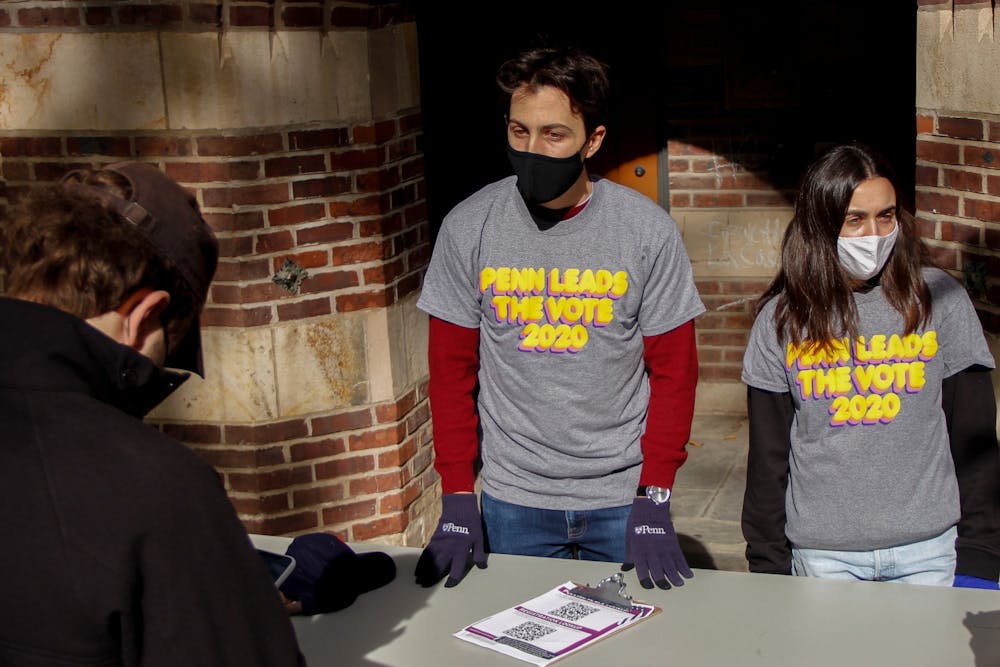
Penn Leads the Vote is encouraging students to campaign for three open positions in the Pennsylvania Municipal Primary Elections on May 18.
With 68 days until the election, PLTV, a nonpartisan group, is gearing up to get Penn students to run for three of the five positions that are responsible for running local polling places: two inspectors and one judge of election. The remaining two positions, clerk and machine operator, are appointed positions.
Executive Director of the Office of Government and Community Affairs Dawn Maglicco Deitch wrote in an emailed statement to The Daily Pennsylvanian that these positions are four-year terms and are elected by the registered voters of the division.
If a vacancy appears in one of the positions, however, the ward leaders and city commissioners are responsible for recruiting and appointing eligible voters to fill those vacancies. A vacancy would occur, for example, if a student graduated before his or her term ended. This would be the case if a student was to be elected and then graduated from Penn and relocated, effectively ending the four-year term early.
"We’re encouraging students to run because, especially for like on-campus districts, the only people who live there are students," College junior and Co-President of Penn Leads the Vote Harrison Feinman said.
PLTV hosted an information session for interested students on March 1.
He added that because most students are 18 years old or older and are registered voters in the district in which they have on-campus or off-campus housing, it is easy for them to get their names on the ballot in a local election, such as this one, which he said is not that competitive of a race.
“Usually no one runs for these petitions," Feinman said. "So you’ll either run uncontested and win, or the winner was determined by 20 votes.
In Philadelphia, there are over 1,690 divisions, or election districts. Penn’s campus falls under ward 27 and primarily encompasses division 18, among many others. Polls will open on May 18 at 7 a.m. and close at 8 p.m.
Students can run as a major party candidate, through their political party’s nomination, as an independent or minority party candidate, or as a write-in candidate. Candidates must then circulate nomination petitions and papers.
For major party candidates, Feinman said that judges need only 10 signatures while inspectors need five, and these signatures must come from residents in one’s party and one’s seat's division. March 10, was the first day that candidates could circulate and file the nomination paper.
According to Committee of Seventy, a nonpartisan civic leadership organization that focuses on promoting ethical and effective government in Philadelphia, the inspectors and judge of elections serve different roles but are both responsible for training and studying election materials. The positions are for two days each year, or more if special elections occur.
Officials will receive a small compensation for the training in addition to the general compensation to which workers are entitled.
The judge of elections is responsible for the overall conduct of the polling place and takes an oath to admit only voters that are appropriately eligible, to prevent fraud, and to ensure that the votes are tabulated correctly. They must also open and close the polls and account for all of the necessary paperwork.
Inspectors are responsible for verifying voters’ registration documents and ensuring that the voting process is legal and fair while monitoring the signatures on the poll book. They also must check the voting machine numbers at the end of the day to verify their accuracy.
In order to be eligible to run for either of these positions, students must be qualified and registered voters of the district in which they are elected, 18 years old, resigned from any city, county, state, or federal appointed or salaried positions two months prior to election, and cannot be a candidate for any office being voted for in the election in which they are serving.
All judges of election and inspectors must attend a training by the County Board of Elections on the use of their machines and duties.
"We think it’s a really good way to get engaged for people who want to learn more about running for office, or just are interested in elections and civic engagement and want to help make sure things run smoothly the polling place,” Feinman said, adding that officials being compensated for their time and work is “a win win.”
The Daily Pennsylvanian is an independent, student-run newspaper. Please consider making a donation to support the coverage that shapes the University. Your generosity ensures a future of strong journalism at Penn.
Donate






